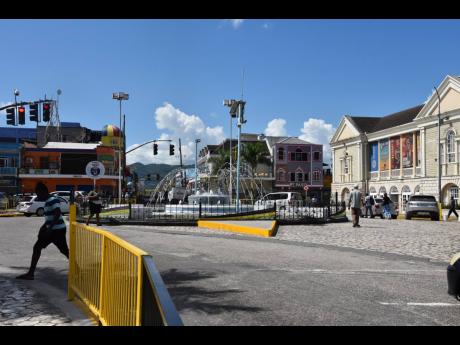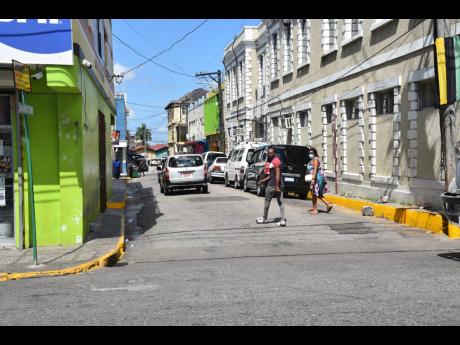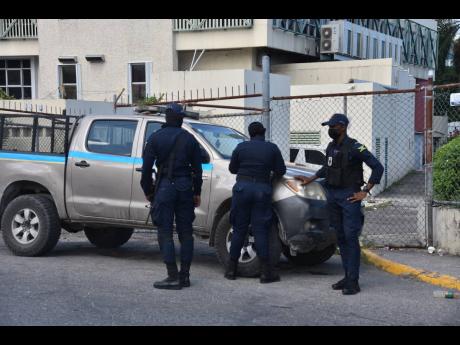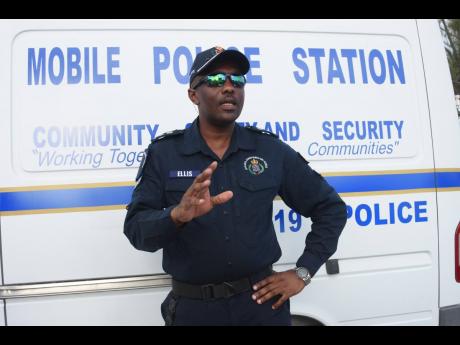Operation Restore Paradise
Locals grateful for return of law, order to MoBay’s once chaotic streets
It’s a welcome new experience for users of the public thoroughfare in the city of Montego Bay, St James, following an intense multi-agency initiative to restore law and order in the popular tourist resort.
The brainchild of Senior Superintendent of Police Vernon Ellis, commanding officer for the St James Police Division, ‘Restoring Paradise, A Public Order Reset’ is pushing for businesses, transportation operators and the general public to comply with the laws as a number of agencies step up enforcement activities.
St James Street is among the roadways singled out in the Jamaica Constabulary Force (JCF)-led operation, targeting street vendors and illegal taxis which have made it difficult for motorists and pedestrians to move about freely.
Last week as The Sunday Gleaner visited the targeted areas, the streets were noticeably cleared of vending, and except for a few delivery trucks near Sam Sharpe Square, vehicles could not stop in the no-stopping zones. Police teams were strategically placed to ensure a free flow of traffic, while Island Traffic Authority personnel prosecuted motorists found operating illegally. Taxi operators were also seen scrambling to direct passengers to the area designated for them to operate.
Prominent businessman and developer Mark Kerr-Jarrett is lauding the initiative, but says the authorities must ensure that it is sustained.
“It is a remarkable improvement to downtown Montego Bay and even the vendors say they appreciate it. Jamaicans have always been under the misconception that law enforcement is a police job, but what this demonstrates is that law enforcement and enforcement of ordinances is a multi-agency responsibility, including the police,” he said.
“This now requires continuity and sustainability and we must have the political will to do it because it is in chaos and disorder that the criminals can have their way with society, but criminals cannot thrive in an orderly environment,” he emphasised.
Dubbed ‘The Friendly City’ in the post-Independent era, Montego Bay, with its enticing nightlife, majestic hotels and classy golf courses, has held its pride of place in local tourism.
While maintaining its status as a top hospitality destination, over the years the city has offered a somewhat controlled visitor experience, with very few tourists encouraged to walk the congested commercial space to patronise local businesses, losing much of its once-captivating allure to Ocho Rios in St Ann and even Falmouth, Trelawny, with its fading Georgian appeal.
BREATHING FRESH AIR INTO THE CITY
John Byles, executive director of Chukka Caribbean Adventures, shares Kerr-Jarrett’s sentiments.
He believes the blueprint for the Restoring Paradise initiative should be used throughout the country.
“From a tourism perspective, the guests will feel safe and be able to explore more and spend more, but public order is a basic expectation of every citizen and seeing it unfold in Montego Bay is like breathing fresh air into the city,” he told The Sunday Gleaner.
In 2014, Byles, a former president of the National Cruise Council of Jamaica, lamented the disconnect between the cruise ships and the walk-off experience among the reasons Ocho Rios and Falmouth, with its spanking new pier, had replaced Montego Bay as first-choice destinations locally.
“There is a separation between the walk-off experience and where they (passengers) get off at the port. It is disconnected from the Hip Strip and other places that offer that sort of experience,” Byles said back then. “The hop-on, hop-off experience would help tremendously because that would take the people into the town.”
Godfrey Dyer, chairman of the Tourism Enhancement Fund, believes the ongoing initiative is the vehicle to return Montego Bay to the glory days.
“We just have to insist that public order is maintained because we cannot afford to go back to the chaos,” said the former hotelier. “The walk-through experience for our visitors needs to return, and a culture of law and order will make it possible, if the recommendation made in our meeting a few days ago is accepted.”
Dyer refused to provide details on the proposal, but said the Montego Bay Cultural Centre and the St James Parish Church on St Claver’s Avenue continue to attract tourist interest.
Police statistics show that up to last Wednesday, 1,055 persons had been killed across the island this year. St James recorded 145 murders to lead the 19 police divisions with 36 more homicides in 2022 than for the corresponding period a year ago.
Shootings, rape, robberies and break-ins have also increased in the parish.
But Superintendent Eron Samuels, head of police operations in St James, admits it is still too early to examine the initiative’s impact on crime.
“We have seen some reduction of illegal activities in the space, but it will take some time for the full result to be evident,” he told The Sunday Gleaner. “What we are trying to do is to create an atmosphere that makes it hard for crime to take place.”
Samuels pointed to a need for the supporting systems such as capital investment to effectively create change, including proper infrastructure to house the affected vendors, cameras for traffic control, as well as the long-awaited expansion of the MoBay Transport Centre promised five years ago, by then Transport Minister Mike Henry.
Discussions are reportedly being held regarding the use of the problematic People’s Arcade property to expand the transportation centre.
According to the police, the facility has been a haven for criminals in Montego Bay for years.
Ironically, it was established by the local authority in the 1990s for vending, but has morphed into living quarters while the merchants took to the streets.
The public health department is also reportedly looking at the preparation of food for sale at the run-down facility.
There are 23 informal communities on the outskirts of Montego Bay, the make-up of which pose a challenge to effective policing. These areas continue to breed gangsters with no regard for law and order, but the cops have netted some success with social-intervention projects, including a breakfast-feeding programme, and an annual youth summer camp at the Salt Spring Primary and Junior High School.
REAPING BENEFITS
Deputy Superintendent Angella McIntosh Gayle, who heads the Community Safety and Security Branch (CSSB) in St James, says attendance, punctuality, and the academic performances of the students have improved drastically since, while the recently held summer camp was oversubscribed.
“There is a major reduction in crime,” McIntosh Gayle claims, while refusing to reveal actual numbers. “Citizens are more cooperative. They tend to assist the police in the fight against crime and this goes to say that if it wasn’t for the work being done in Salt Spring, we would not be getting these results.”
She continued: “The citizens don’t want the negativity any more. They want their children to grow in an environment where if they go for a job, employers will be happy to accept them.”
Other community policing activities being employed in the troubled areas include walk-throughs and community meetings as well as hard-core strategies targeting gangsters.
Samuels said it would be unwise to discuss crime numbers publicly as the factors vary with each area, but noted that operations targeting criminals have intensified, resulting in St James most wanted also being held.
“We have some work to do in the Spring Mount, Maroon Town area,” he added, referring to one person as “a thorn” in the police’s side.
“But we are utilising all resources and I know we will capture him very shortly,” he added.
Samuels said that providing the necessary support for a long-lasting law-abiding culture is the only way forward.
“The High Command is in full support of the initiative and they have stated that it must continue, so I have no reason to doubt that we will get the necessary support,” he told The Sunday Gleaner.




